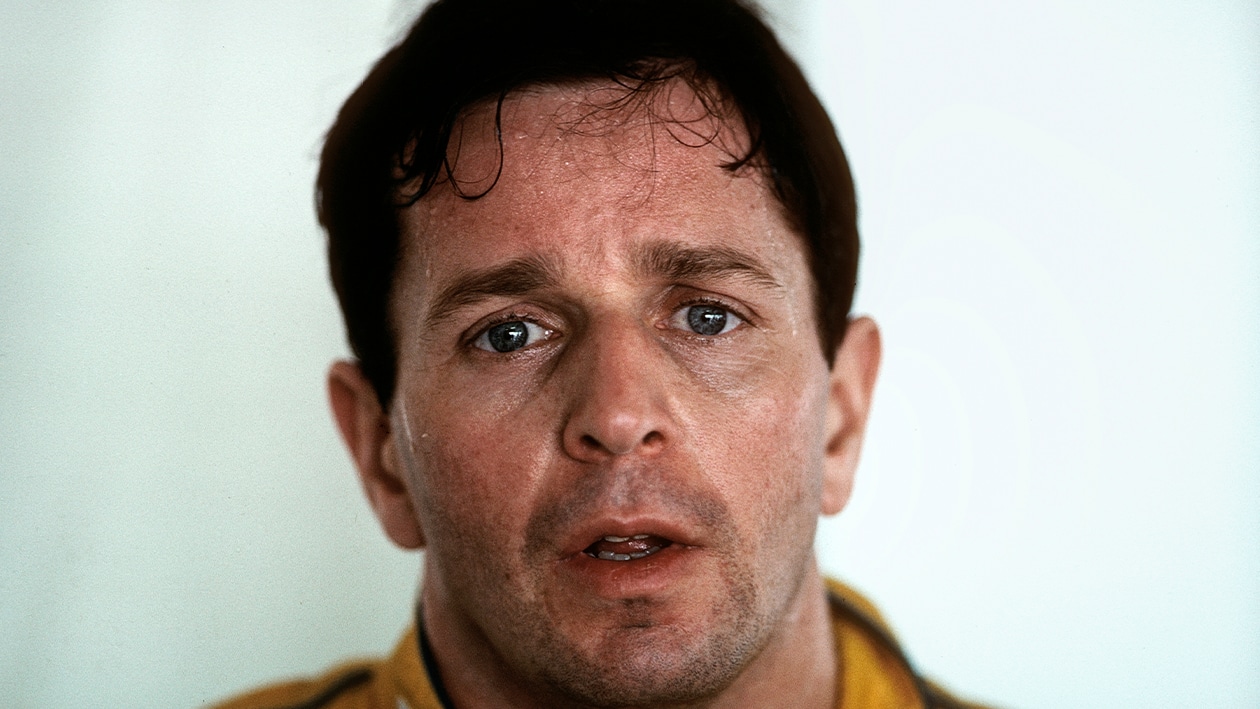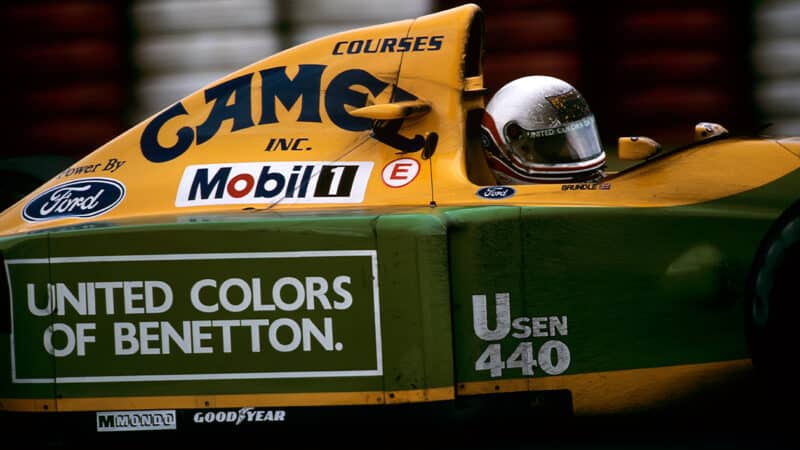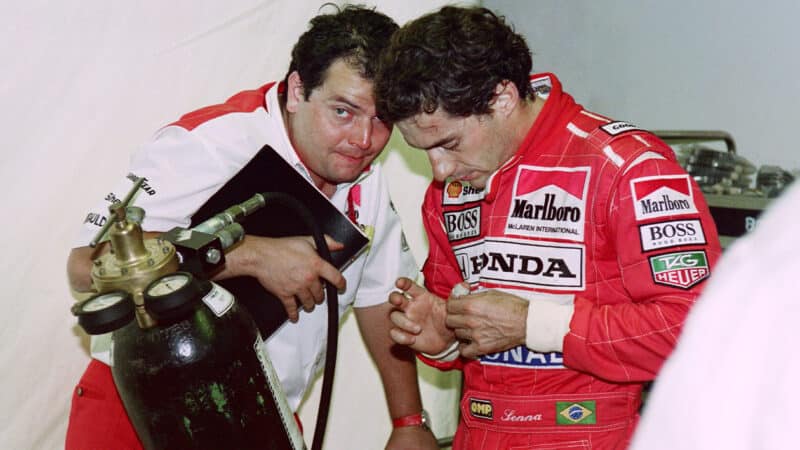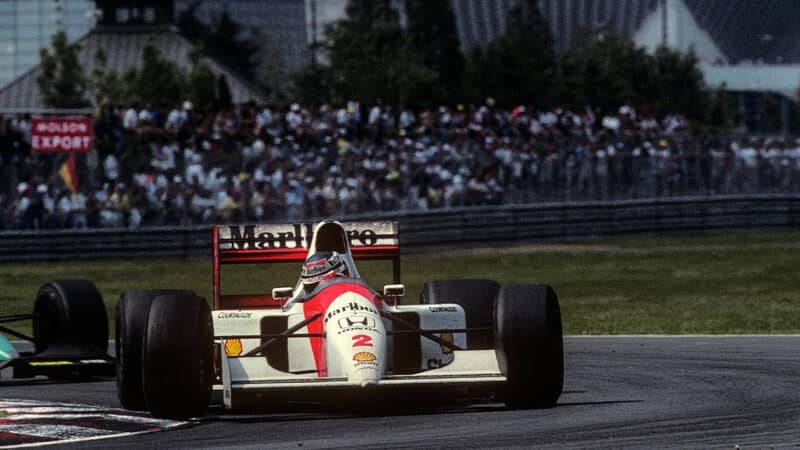Martin Brundle: The one that got away — 1992 Canadian Grand Prix
Martin Brundle had pulled a neat move on Schumacher, Senna and Mansell had retired from the 1992 Canadian Grand Prix. He had never driven a better car. He was catching the leader. Which is when it all went wrong... By Adam Cooper

Benetton driver Martin Brundle pictured at Silverstone, a month after the 1992 Canadian GP
Paul-Henri Cahier/Getty Images
“In my 158 grand prix starts I twice had a car that could win the race,” recalls Martin Brundle. “One was Canada 1992, and the other was Spa later that same year, when Michael Schumacher finally won — but I should have.”
Brundle had got the biggest break of his career when he signed for Benetton-Ford in 1992. Or it should have been. His misfortune, of course, was to arrive at the team just as man-of-the-moment Schumacher was beginning to make his mark.
The season did not begin well for the Englishman, but his luck changed with a good run to fourth in Imola, followed by fifth in Monaco. Canada was next, and his confidence was high.
“I always liked the Montreal circuit. It suited my driving style very well, and I just relished it. The key to it was to have a car that was really spot-on under braking for those chicanes. Also, the corners open up, so if you just dialled in a touch of understeer, you could get on the power earlier. I was always good under braking, and I was always more comfortable with a car that had a touch of understeer — more Alain Prost than Keke Rosberg school.”

Brundle had a car with winning pace in Montreal… for some of the race
Paul-Henri Cahier /Getty Images
Seventh in qualifying, he was hopeful of a much better performance on race day.
“I remember having a real brainstorming session with Pat Fry, my race engineer, on Saturday night. It was case of look at the data, rack your brain, use your experience, and come up with something that you knew was going to work.
“The beauty of the B192 was that it was a very simple car. The frustrating thing was it didn’t have any of the bells and whistles of the Williams-Renault, which had active suspension and a semi-auto gearbox. It was bog standard, with a clutch pedal, H-gate gearbox, springs and dampers. We were lacking gizmos, but it was simple to set-up. And for Sunday, we just aced it. In the warm-up, I was quickest until Nigel Mansell shaded me by a thousandth on his last lap after the flag was out.”
Come the race, Brundle soon passed Johnny Herbert‘s Lotus for sixth, then gained another place when Mansell, impatient to be past Ayrton Senna‘s McLaren, crashed his Williams at the final chicane.
“Nigel was sitting in the car for a while, and then he limped away. I remember thinking, ‘What’s wrong with him?’
“It was one of those nice days when we were in the thick of the race; I could see a Williams up ahead. So often the only time you see a queue of cars is when they are lapping you! I felt fantastic.”
Fifth became fourth when leader Senna stopped because of an electrical problem. Only Gerhard Berger (McLaren), Riccardo Patrese (Williams) and Schumacher now lay head.
“I got tucked up behind Michael. He held me up, for which he apologised — some years later! Then we caught Gianni Morbidelli‘s Minardi, and I got a run at Michael into the last chicane — and went between him and Morbidelli. Unlike Hungary later in the year, Schuey didn’t actually try and bin me! So I got through.”

Senna debriefs after retiring — and poking around Brundle’s Benetton
Robert Giroux/AFP via Getty Images
Patrese retired almost immediately, which meant Brundle was now second behind Berger. It was all looking good: the Austrian had buzzed his McLaren’s Honda engine early in the race, and the Benetton’s brakes and tyres were in better shape, too. “I was pulling clear of Michael and could see that I was reeling Gerhard in. I just knew that if I a got sniff of him anywhere, that I was going to be past, because my car was probably the best I’d ever had on the brakes.
“I’d been in F1 for eight years, or something like that, and suddenly I felt this enormous strength and power. It was an incredible feeling, as I saw the McLaren coming closer to me.”
He saw it even clearer once he realised that he still had a visor tear-off to use. With perfect vision restored, he set the fastest lap. He would soon be right on Berger’s tail…
“Then, going through Turn 5, I heard a strange noise. I radioed in and said, ‘I think we have got a problem’. Coming into Turn 7, the car lost all its drive.”
Brundle’s bad luck had struck once again, and it was galling to discover that ‘finger trouble’ was the cause.
“It turned out that the bolts holding the diff together had been put in the wrong way round, and they’d come undone. Anyway, I stopped right by Senna, who was leaning over the barrier. They towed my car in, and then his and mine stood line astern. I took my helmet off and he came up and just said, ‘It’s tough, isn’t it?”

Brundle’s retirement gave Berger breathing space in the lead
Paul-Henri Cahier/Getty Images
“I was standing there, absolutely gutted, thinking, ‘What a lost opportunity’. Then Ayrton started looking around my car. He put his helmet on, plugged into his car and radioed back to the pits. He gave them a run down on my tyres, which were still in supersonic condition. He did this because Michael was catching Gerhard — my team-mate was catching his team-mate! I thought that was extremely smart of him.” It was a classic piece of gamesmanship by the Brazilian, but Martin had the last laugh.
“A motorbike came to pick us up. I don’t know whether he pulled rank or just happened to be nearest, but he jumped on it. So I took the opportunity to sit in his car and have a good old poke around to see what I could learn, making a mental note of all the switches and buttons, trying the pedals, and generally feeling quite good in it I suppose I learned diddly-squat, but it was a lot of fun!
“The last thing I remember of that day is going to the airport. In the lounge, I poured myself the biggest whisky I’ve ever had. I was half-drunk before getting on the plane, because I just knew that it had been a significant day in my life: it was either the beginning of something, or the end of something. After all that misery, all the trials and tribulations, the broken legs, I’d just had confirmation that I could win a grand prix; but on the other hand, it still hadn’t happened.”
That first victory never did come, and Martin Brundle ranks an unfortunate second behind Andrea de Cesaris on the list of the most experienced drivers who failed to win a grand prix.
“A win would have meant a completely different career, because at the end of that year I lost the drive, and I was on the back foot from then on. I went to Ligier at the last minute in 1993; I went to McLaren just 72 hours before the first race in ’94, then back to Ligier. It all went wobbly. A win is a huge hurdle that, if you clear, elevates you to a different level on team owners’ shopping lists.”
